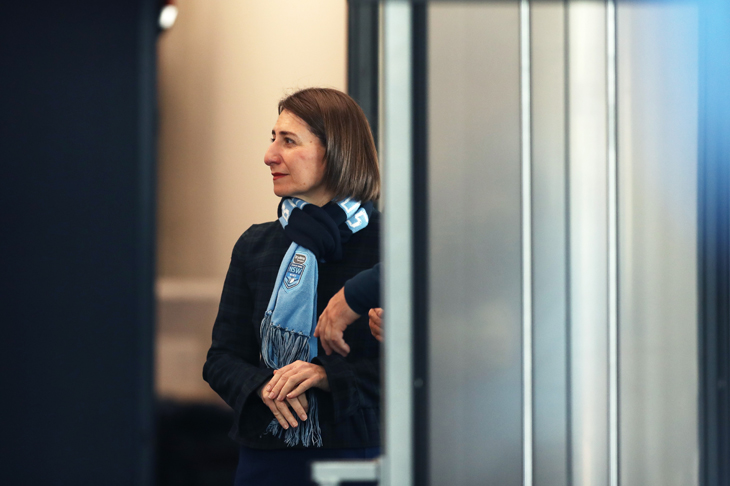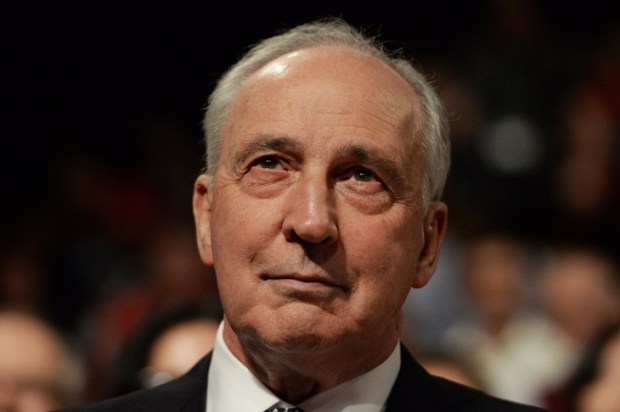‘The sound of men arguing over our personal reproductive health choices hurts my ears and it offends my very core,’ wailed NSW Greens MP Jenny Leong last week, although not when that man is Independent MP, Alex Greenwich, the proud ‘father’ of the Reproductive Health Care Reform Bill 2019, which he introduced into the NSW parliament on August 8.
Greenwich, who married his husband in 2012, would like to have kids one day, but it’s not an immediate priority. ‘Paul Keating proven wrong: “two blokes and a cocker spaniel (or fox terrier x whippet rescue dog named Max)” do constitute a family,’ he tweeted in 2017. Most weekends, after walking Max, he and his husband go ‘somewhere lovely to eat – we’re foodies,’ and then watch ‘soapies like Revenge or reruns of Dynasty.’ ‘We’re no different from any other married couple,’ he says, which may be true in his electorate of Sydney — it has more young, rich, gay men than any other state seat, the lowest proportion of households with children (only one in ten) and the highest proportion of same-sex couples (one in ten) who are overwhelmingly male.
Introducing his bill, Greenwich did not speak about his personal experience of abortion, which is, presumably, limited, but of a 28-year old mother of five in Blacktown, who, in 2015, was pressured by her boyfriend to have an abortion at 26 weeks because he didn’t want to have a child. Clinics told her it was too late, so she procured tablets and induced an abortion at 28 weeks. Feeling ill, she was taken to hospital where an emergency caesarean section was performed and both she and the child survived, as do 90 percent of babies born at 27 weeks.
Abortion is legal in NSW if a doctor deems the physical or mental health of the mother is in danger. Prosecutions are rare and only four people have been found guilty of offences in the last 25 years, with all given juvenile court orders or good behaviour bonds, including the Blacktown mum. In her case, her health was not at risk, so the law protects the foetus, ‘from the time of conception through all stages of pregnancy to the point of birth.’ Under Greenwich’s bill that would change — a pregnancy can be terminated for any or no reason up to 22 weeks, and after that on the advice of two doctors.
‘When a pregnancy is terminated, it is usually for a very good reason that is, frankly, nobody else’s business,’ Claire Harvey, deputy editor of the Sunday Telegraph fulminated in an article titled, ‘Stop lying about women who have abortions.’ Not according to Jaya Taki, the former girlfriend of an NRL footballer who told the Queensland parliament last year how she was coerced into an abortion by her boyfriend who subjected her to ‘a horrifying amount of domestic abuse.’
Harvey writes, ‘In the late stages of pregnancy, terminations only happen when something has gone catastrophically wrong: a disability, a crisis of abuse, a crippling mental illness.’ Yet there was nothing catastrophically wrong in the case Greenwich cited nor with 125 late term pregnancies in Victoria in 2016, who were terminated for maternal psychosocial reasons. Even some congenital abnormalities cited to justify an abortion are treatable. In 2015, 11 pregnancies in the UK were terminated because of a cleft palate, which can be surgically corrected.
The most horrific aspect of the proposed NSW legislation is that a healthy child who has survived an abortion can be left to die. An amendment introduced by Liberal MP Tanya Davies, the former minister for women, to protect babies’ lives if a pregnancy is terminated at or after 20 weeks and to ensure they receive all necessary medical treatment, was rejected. How often do babies survive abortions? It’s hard to say. In Victoria, in 2016, 33 babies with suspected or confirmed congenital abnormalities were born alive and left to die out of 310 late-term abortions. In Queensland, more than 200 babies who survived abortions between 2005 and 2015 were left to die. Some of these cases may involve foetal anomalies so severe that the parents choose to swaddle the newborn in a blanket and allow it to die in their arms, without futile medical interventions. In many abortions, the foetus is dismembered in the womb. Yet there are survivors.
Melissa Ohden’s 19-year-old mother was forced to have an abortion at 31 weeks and was not told that her baby survived. Ohden is now a happy, healthy 41-year-old anti-abortion campaigner. She testified before the US Congress in June that she was ‘laid aside’ to perish on the instructions of her grandmother — a senior nurse at the hospital where she was born. She survived because another nurse courageously took her to the neo-natal intensive care unit saying the baby was gasping for breath, ‘so, I couldn’t just leave her there to die!’
Premier Gladys Berejiklian, who supported the bill, has been mostly invisible during the debate and said that what was important to her was that everyone had the chance to express their views. Yet the bill was allocated only three days, less than the time devoted to debating plastic shopping bags. Berejiklian also replaced Davies, who is pro-life, after the election in March, with the Nationals’ Bronwyn Taylor, who supported the bill.
Davies introduced an amendment to rule out gender selection, pointing to research which showed that in Victoria, between 2011 and 2015, over 300 girls who would have been born to Indian, Chinese and South East Asian migrants, were aborted after an ultrasound identified their sex. This, according to Fairfax columnist Jacqueline Maley was a ‘dishonest at best and xenophobic at worst’ furphy, directly imported from American, hard-right, religious conservatives and one ‘we could do without.’ Yet on SBS radio, hardly a bastion of US pro-lifers, Macquarie University demographer Dr Nick Parr said sex-selective abortions were the most plausible explanation for the statistically significant deficit of girls born in Indian and Chinese communities.
What worried Nationals MP Leslie Williams however was the ‘very dangerous effect’ Davies’ amendment could have of ‘opening the doors to discrimination and profiling of women of colour based purely on negative stereotypes about their communities.’ The amendment was rejected and despite the fact that more Liberals voted against the bill than in favour of it, it passed the lower house. Its passage has provoked an outpouring of anger and the Premier looks out of touch with her party and with the ‘quiet Australians’ who delivered her victory in recent elections. Supporters of the bill however erupted into cheers, which, one imagines, did not hurt Leong’s ears or offend her very core. Au contraire the right to terminate an unborn life is, it seems, something to celebrate.
Got something to add? Join the discussion and comment below.
Get 10 issues for just $10
Subscribe to The Spectator Australia today for the next 10 magazine issues, plus full online access, for just $10.
You might disagree with half of it, but you’ll enjoy reading all of it. Try your first month for free, then just $2 a week for the remainder of your first year.














Comments
Don't miss out
Join the conversation with other Spectator Australia readers. Subscribe to leave a comment.
SUBSCRIBEAlready a subscriber? Log in